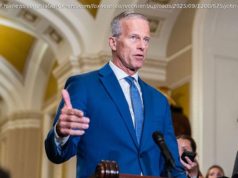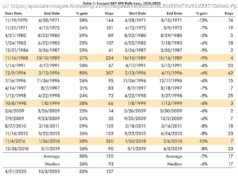Christpher Wray, then working in the Justice Department, was notified months before the public knew about the death of a detainee at Abu Ghraib prison in Iraq in 2004.
President Donald Trump’s choice for FBI director was notified months before the public knew about the death of a detainee at Abu Ghraib prison in Iraq in 2004, and was at the very least on the fringes of discussions of lawful military detention and interrogation techniques in 2003, documents from Wray’s time in the post- 9/11 Bush administration show.
Trump announced in a tweet Wednesday that he planned to name white-collar attorney Christopher A. Wray to succeed Jim Comey as FBI director. Most immediate reporting focused on Wray’s role as the personal attorney for New Jersey Gov. Chris Christie in the scandal known as Bridgegate.
But a deeper dive shows that during his period as assistant attorney general in charge of the Department of Justice Criminal Division Wray was notified early about the ongoing Central Intelligence Agency investigation of abuse at Abu Ghraib. Notably, he was alerted to the suspected homicide of a captive who came to be known as the iceman because of lurid, leaked photos showing the corpse of Manadel al-Jamadi packed in ice.
See Wray’s Bush administration-era Department of Justice profile
A Feb. 20,2004 memo, “ Possible Violations of Federal Law, ” notified Wray of the suspected homicide of Jamadi and an ongoing CIA Inspector General’s investigation of his death after his capture by a Navy Seal team in Iraq three months earlier. “I am writing to you pursuant to Title 50 U. S. C. §403q (b) (5) to report information concerning possible violations of federal criminal law, ” wrote then CIA Assistant Inspector General for Investigations Mona B. Alderson.
Less than three months later, on May 5,2004, Wray told the Senate Judiciary Committee, in response to a question from Vermont Sen. Patrick Leahy, “My principal awareness of the abuse that you are describing, that you are referring to, is through the news media, and like you and like so many others, obviously I deplore any mistreatment.”
Leahy, the committee’s senior Democrat at the time had asked Wray specifically, “What actions has the Department of Justice taken with respect to investigating and possibly prosecuting criminal conduct by American civilians at the Abu Ghraib prison in Iraq or at any of the other places where the administration has evidence, and the administration does have evidence, of other torture that has not been made public yet? What actions have you taken?”
The Congressional record shows Wray replying: “I am not aware of any referral from the Department of Defense to the Justice Department or the FBI relating to these matters.” He makes no mention of the CIA notification.
Soon after that Leahy wrote then Attorney General John Ashcroft that Wray may have provided “less than a complete and truthful answer.” The letter, part of a trove obtained by the American Civil Liberties Union through FOIA litigation, shows Leahy writing, “I am concerned about this” beneath his signature. It was not immediately known on Wednesday whether Ashcroft or Wray wrote Leahy back.
Another item linking Wray’s name to insider information on the abuse questions was unearthed with the leak of graphic photos of soldiers abusing captives at Abu Ghraib:
A single page with his name and the date 5/6/04 is inexplicably written on the top of six bullet points of FBI concerns and awareness of “Abusive Interrogation Issues” at Guantánamo, Iraq and Afghanistan. That same day, Wray wrote a one-page letter to then Pentagon General Counsel William J. Haynes II entitled “Iraq detainees at Abu Ghraib prison.” What Wray told Haynes is not know because the Department of Justice redacted it entirely when it provided the cover sheet but not the document to the ACLU.
Wednesday, Attorney General Jeff Sessions described Wray’s post-Sept. 11 role at the Department of Justice this way: “At that time, he supervised both the general crimes and anti-terrorism roles of the Department, and worked closely with the FBI as the Bureau shifted to a much larger counterterrorism role. He has tremendous respect for the FBI’s agents, analysts, and professional staff, and the agents he worked with enthusiastically affirm his leadership and integrity.”
In addition, former Bush administration deputy attorney general John Yoo, author of an 81-page document that came to be known as a “Torture Memo” testified in 2008 that Wray may have gotten an early draft of the document “Military Interrogation of Alien Unlawful Combatants Held Outside the United States.” Yoo issued the then-secret memorandum addressed to Haynes on March 14,2003, five days before the U. S. invasion of Iraq.
It analyzed the military’s authority and obligations under both U. S. law and the Convention Against Torture and advised that federal laws on torture and other abuse did not apply to agents interrogating foreigners overseas. Yoo concluded, “even if the criminal prohibitions outlined above applied, and an interrogation method might violate these prohibitions, necessity or self-defense could provide justifications for any criminal liability.”
The memo was formally withdrawn by Feb. 4,2005.
Five years later, Yoo testified at the House Committee on the Judiciary Subcommittee on the Constitution, Civil Rights and Civil Liberties along side attorney David Addington, the former lawyer for Vice President Dick Cheney, that he distributed drafts of the memo to certain people at the Justice Department, including Attorney General Ashcroft’s counselor, Adam Ciongoli .
“I can’ t say definitively everybody who got a copy either, ” Yoo testified. “I’ m just saying because these were sensitive matters, we had to transmit them. I believe we may have given it to the principal associate deputy attorney general at the time, whose name was Chris Wray.”
Neither Yoo nor Wray responded to emails Wednesday seeking comments, clarification or elaboration.
An examination of Guantánamo Distinguished Visitors logs released under the Freedom of Information Act lists Yoo but not Wray among the dozens of lawyers who visited the detention center at the U.
Home
United States
USA — Financial Trump’s pick for FBI director was alerted early to detainee abuse






